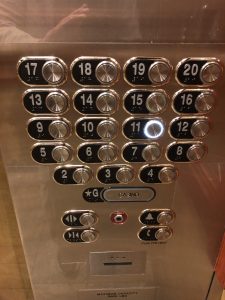
I got into an elevator and noticed something I’ve rarely seen — a button for the 13th floor!
Most buildings of this size skip that number because it’s supposedly unlucky. Those who believe that nonsense — especially those who go to the “14th” floor — are fooling no one but themselves, because it’s not like the architect left one story completely empty. There is always a thirteenth floor, whether it’s listed or not.
This gets even odder in European buildings, where you’ll find the lobby is not on the first floor. It’s on the ground floor. If you want to go to the first floor, you have to ascend one flight. Does that make their twelfth floor unlucky?
I’ve also been in large casino facilities that claim their steakhouse and party bar are on the fiftieth floor. What they don’t say is that, because four is an “unlucky” number in many Asian cultures — which used to be a huge target market for those venues, much smaller now with the growth of the Macau gambling district off the shore of Hong Kong — they have no 40th-49th floors (although, oddly, they have 14, 24, 34, and 44). The venue is essentially deciding to number its stories by its own whim, not according to actual arithmetic. But you’d never know it, because the elevator is an express, so you don’t see the intermediary floor numbers flashing above you.
It all comes down to superstition, which still drives a lot of betting psychology. Thus, you’ll see craps players lining up the dice a certain way before they throw them, believing they can control the outcome. Or a roulette player putting chips on their (and their children’s) birth dates or an anniversary. Or a blackjack player believing that they always lose when a certain dealer is distributing the cards.
Frankly, none of this bothers me all that much, because it weren’t for superstitious gamblers who don’t understand how math works, there wouldn’t be many casinos, which would mean fewer poker rooms for me to play in legally.
For that, I thank you thirteen times.
